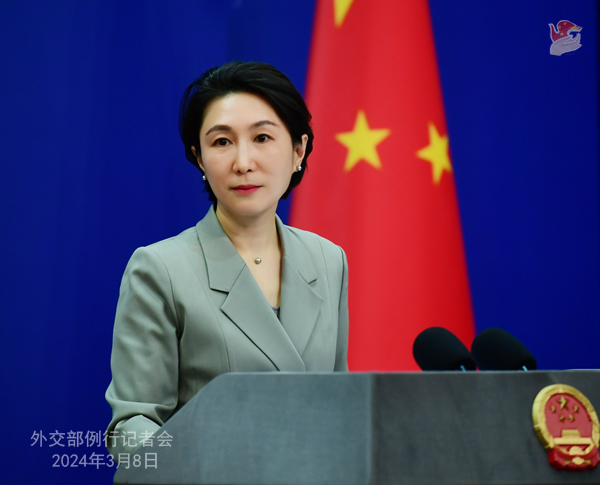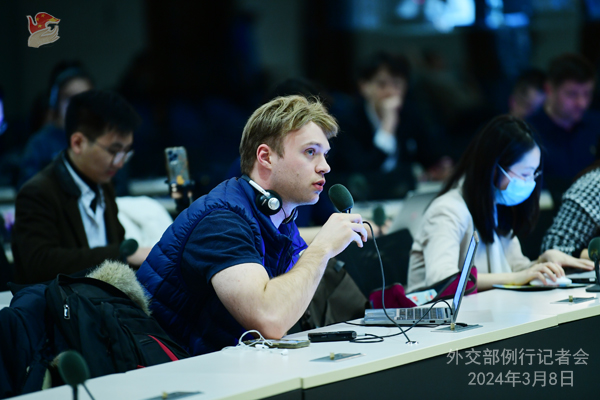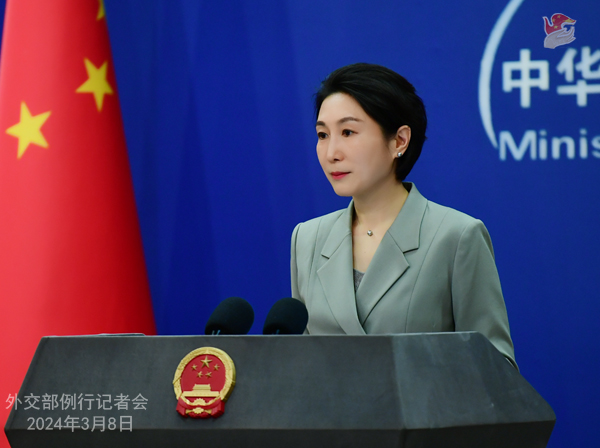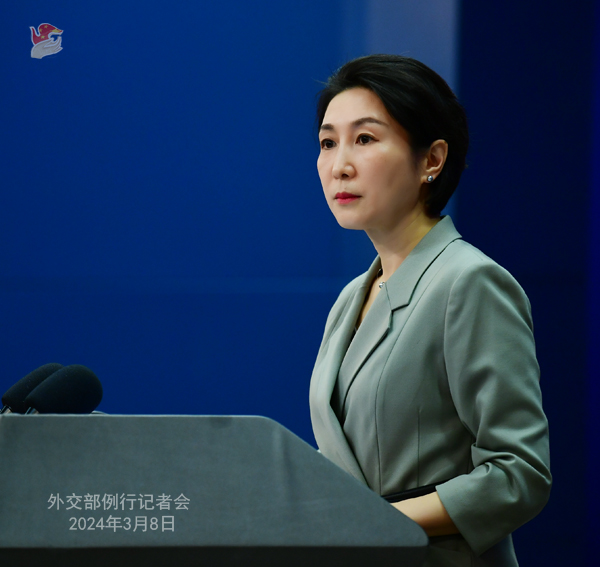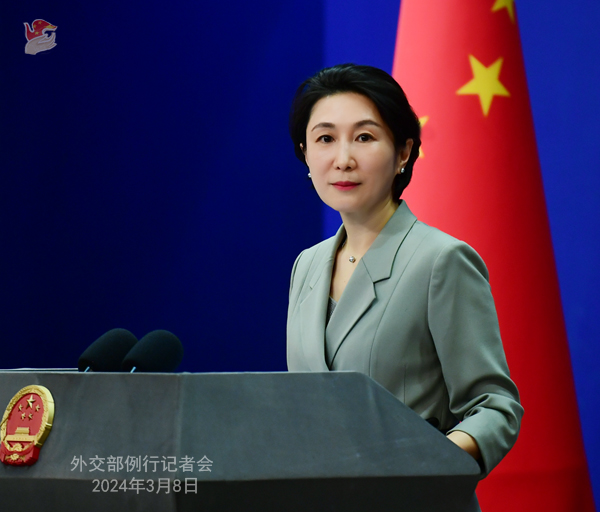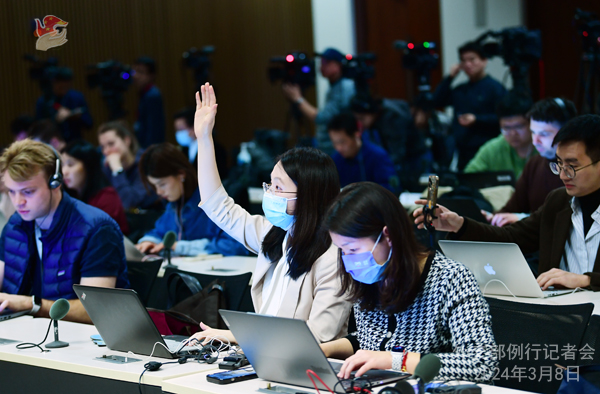| Foreign Ministry Spokesperson Mao Ning’s Regular Press Conference on March 8, 2024 |
| 2024-03-08 20:33 |
|
China News Service: Foreign Minister Wang Yi announced at the press conference on the margins of the two sessions visa exemption on a pilot basis to six countries including Switzerland, which attracted great attention. Could you share with us what China has achieved in visa policies so far? What efforts have the Ministry made in making the outbound trips of Chinese citizens easier? Mao Ning: Over the past year, we have unveiled new measures to facilitate visits to and from China to advance high-quality development and high-standard opening up. China makes Chinese passports more valuable. As of now, China has signed mutual visa exemption agreements with 157 countries, covering different types of passports, reached agreements or arrangements to simplify visa procedures with 44 countries, and enjoyed comprehensive mutual visa exemption with 23 countries. In addition, over 60 countries and regions offer visa-free or visa-on-arrival policy to Chinese citizens. This makes it more convenient for Chinese citizens to travel abroad. During the recent Spring Festival of the Year of the Dragon, there was a salient increase in the number of Chinese outbound trips and foreigners’ inbound trips for tourism and family-visiting purposes thanks to the resumption of flights and mutual visa-free policies. Take Singapore, Malaysia and Thailand who have ushered in a “visa-free era” with China as an example, the number of Chinese tourists to these three countries generally resumed to the level reached during the Spring Festival in 2019. The number of tourists from these three countries to China has risen by 15 percent compared with that during the Spring Festival in 2019. This is a great boost to friendship, exchanges and people-to-people bond between China and other countries. As Foreign Minister Wang Yi said when he met the press on the margins of the two sessions, China hopes to work with more countries to build fast-track networks for cross-border travels, make it more convenient for Chinese citizens to travel abroad, and make foreign friends feel at home in China. AFP: It was reported that a US army intelligence analyst was arrested on Thursday for suspicion of providing US national defense information to China. Previously on Wednesday, a Chinese national living in the US was arrested for suspicion of stealing Google’s AI technology. What is the Foreign Ministry’s response to these two cases? Mao Ning: I do not have information on either of the two cases you mentioned. I’d like to stress, as a principle, on the so-called arrest of a Chinese national for suspicion of stealing Google’s technology, that China attaches great importance to and has made active efforts in protecting intellectual property rights. We protect the lawful rights and interests of all domestic and overseas IP owners in a fair and just manner. At the same time, we oppose the US abusing state power to go after Chinese businesses and nationals. We will do what is necessary to safeguard the lawful and legitimate rights and interests of Chinese businesses and nationals. CCTV: Prime Minister Gaston Browne of Antigua and Barbuda recently said that small island nations face serious consequences from climate change and he hopes to see content related to climate response during China’s two sessions. What’s your response? Mao Ning: I noted that during this year’s NPC and CPPCC sessions, deputies and members pay great attention to climate change. CPPCC member made a proposal on enhancing cooperation with small island developing states to together actively respond to climate change. Climate change is a global challenge and calls for a global response. China is committed to actively responding to climate change and has all along undertaken due international responsibilities commensurate with its national conditions. Under the framework of South-South cooperation on climate change, China provided support and assistance to African countries, small island nations and fellow developing countries to the best of our capabilities. China is an advocate and doer in global environment and climate governance. Premier Li Qiang in the Report on the Work of the Government stressed that it is important to enhance ecological conservation and take comprehensive steps to improve the environment. China will boost the green and low-carbon economy and actively and prudently work toward peaking carbon dioxide emissions and achieving carbon neutrality so as to build a beautiful China featuring harmony between humanity and nature. China will continue to take an active part in and advance global climate governance, expand cooperation space for green development, work with all countries in responding to climate challenges and together protect this blue planet that we all call home.
Reuters: According to a statement released yesterday, some US lawmakers are planning to ask the State Department to raise the risk level of travel advisory on Xinjiang. They also made accusations against forced labor targeting Uyghurs and other ethnic minorities. What is China’s comment on the statement of the US lawmakers? Mao Ning: China has stated its position multiple times on the so-called “forced labor” in Xinjiang, which is an out-and-out lie. Certain US lawmakers need to view China in an objective and just manner, and recognize that Xinjiang now enjoys social stability, economic prosperity and harmony among all ethnic groups, rather than stick to ideological bias and mislead the US people. AFP: Malaysian Prime Minister Anwar Ibrahim said yesterday that “China sees adverse reactions to its rise—militarily and economically—represent nothing less than an attempt to deny its legitimate place in history.” He also said that Southeast Asian countries should “uphold the sanctity of international law.” His remarks are quite different from recent remarks made by the Philippines, the US and other countries on China. What’s your response? Mao Ning: China’s development strengthens the global force for peace and enhances stability in the international community. China’s development relies on independence and our own efforts. China is always committed to working with countries in the region and around the world to uphold peaceful development and win-win cooperation, and advocate an equal and orderly multipolar world and a universally beneficial and inclusive economic globalization. China remains a staunch force for peace, stability and progress in this region and the world. Bloomberg: It’s been reported that India has stationed 10,000 new troops along the border with China. Can you respond to that? Mao Ning: India’s move of strengthening military deployment along the border with China is counterproductive to the two countries’ effort to ease the situation at the border and not conducive to safeguarding peace and tranquility of the border areas. TV Tokyo: The famous Japanese manga artist Akira Toriyama passed away due to illness. His masterpiece “Dragon Ball” draws on the story of China’s “Journey to the West” as its background. Do you have any comment about his death? Mao Ning: We express deep condolences over the passing of Mr. Akira Toriyama and sincere sympathies to his families. Mr. Toriyama is a renowned manga artist, whose works are popular in China. I noted that many Chinese have expressed condolences over his passing online. We hope and believe that more people with vision in Japan will make active contribution to the cultural exchange and friendship between China and Japan. Global Times: We’ve learned that another Chinese student when entering the US border at the San Francisco International Airport was taken to a dark room for interrogation and detained for over 20 hours by US border control staff. Several law enforcement personnel interrogated the student in turn for 12 hours. The student’s visa was revoked and the student was banned from entering the US and repatriated back to China. What’s your comment? Mao Ning: For some time, the US out of political purpose has been frequently harassing, interrogating, and deporting Chinese students without just cause. Recent incidents time and again show that the acts by the US far exceed the scope of normal law enforcement with strong ideological bias. The US moves seriously infringe on legitimate and lawful rights and interests of persons concerned, disturb normal cross-border travel between China and the US and go against the common understandings reached by the two presidents on enhancing and facilitating China-US cultural and people-to-people exchanges. China strongly deplores and firmly opposes this and has made solemn démarches to the US. The US always portrays itself as open and a place for freedom and claims to be emphasizing US-China cultural and people-to-people exchanges and welcoming Chinese students to study in the US. In fact, the US keeps overstretching the concept of national security and takes selective, discriminatory and politically motivated law enforcement actions against Chinese students. It is essentially driven by the Cold War mentality held by certain people in the US. China urges the US to stop harassing Chinese students traveling to the US under the pretext of national security, stop poisoning the environment of public support for China-US relations, and stop obstructing friendly interactions between the two peoples. China will take resolute measures to safeguard legitimate and lawful rights and interests of Chinese citizens.
Kyodo News: Since 2014, 17 Japanese nationals suspected of espionage have been arrested. The Chinese government has not yet released what illegal activities they have committed. Japan believes that its nationals should abide by Chinese laws and regulations. However, the lack of judicial transparency triggers concerns among Japanese investors. Economic experts in Japan said that Japan needs a safe investment environment in China. What’s your view on this? Mao Ning: I want to stress that China is a law-based country. All law enforcement and judicial activities in China are carried out based on facts and law. Those who abide by laws and regulations and companies that conduct lawful operation have nothing to worry about. China will stay committed to high-standard opening up, including providing a world-class, market-oriented business environment governed by a sound legal framework for companies from all countries, including Japanese companies. Bloomberg: I would like to follow up on my question before. Can you tell me whether or not the fact that India is stationing 10,000 more troops is dangerous? And is the Chinese military considering retaliatory measures? Mao Ning: China is always committed to upholding peace and tranquility in the border areas. India’s moves are not conducive to peace and tranquility at the border and do not conform with common understandings reached by China and India on deescalating tensions in the border areas. CCTV: The 161st ordinary session of the Council of the League of Arab States at the ministerial level adopted the Arab-China resolution. The resolution stressed that the Arab states attached importance to their relations with China, reaffirmed their support to the one-China principle and stood ready to advance their cooperation with China across the board under the guidance of the Belt and Road cooperation. They welcomed China to hold the 10th ministerial conference of the China-Arab States Cooperation Forum and appreciated China’s diplomatic efforts to support the cause of the Arab states, achieve a peaceful resolution of the regional crisis and advance international and regional peace and security. What’s your comment? Mao Ning: The Council of the League of Arab States at the ministerial level specially adopted the China-friendly resolution for the 44th time straight. We highly appreciate it. The resolution demonstrates the profound and longstanding China-Arab friendship and the resolute determination of the Arab states to grow their relations with China. The first China-Arab Summit was held successfully in December 2022, at which the two sides agreed to strive for a China-Arab community with a shared future in the new era and steer the China-Arab relations toward the new era of further development. This year marks the 20th anniversary of the China-Arab States Cooperation Forum. By taking the 10th ministerial conference as an opportunity, China stands ready to work with the Arab states to have a systemic view of the Forum’s good experience, deliver on the results of the first China-Arab Summit, deepen practical cooperation across the board, and jointly speak up on major regional and international issues for the building of China-Arab community with a shared future. TV Asahi: During past years’ two sessions, Japanese media outlets always had the opportunity to raise questions at the Foreign Minister’s press conference. However, why didn’t we get the opportunity to ask questions at yesterday’s press conference? Mao Ning: I believe that you noted over 900 Chinese and foreign journalists participated in the Foreign Minister’s press conference. Foreign Minister Wang Yi answered dozens of questions but could not take every question due to the time limit. We appreciate your understanding. Beijing Daily: Venezuela’s National Electoral Council set the presidential election for July 28, the birthday of the country’s former President Hugo Chávez. What’s your comment? Mao Ning: China wishes Venezuela smooth and successful elections.
Shenzhen TV: Recently Bloomberg published a report, alleging that “Hong Kong says Telegram and Signal should be prohibited in Article 23 proposal” and that “Hong Kong security law public consultation lists Facebook, YouTube ban.” The Hong Kong SAR government issued a statement, expressing strong disapproval and condemnation over Bloomberg’s false report, which generated misunderstanding and panic. Bloomberg withdrew the false report afterwards, updated it and made a clarification. What is your comment on this? Mao Ning: Completing the legislation on Article 23 of the Basic Law is the constitutional responsibility of the government of the Hong Kong SAR and what must be done for the lasting stability and security in Hong Kong and the sound implementation of One Country, Two systems in the long run. It has got extensive support from the Hong Kong society. The draft bill gazetted today fully shows that this legislation strikes a balance between safeguarding national security and protecting rights, freedoms and economic growth. It will provide safeguards for the high-quality development and high-standard opening up in Hong Kong, as well as the sound and steady implementation of One Country, Two systems. Boomberg’s false report triggered misunderstanding and panic in the public and affected the relevant legislation. It is a severe mistake. The Hong Kong SAR government made solemn statements and the Commissioner’s Office of China’s Foreign Ministry in the Hong Kong SAR made serious démarches to Bloomberg. Bloomberg retracted the previous report and made corrections. In the new report, it acknowledged that the previous one misreported the story, expressed sincere apologies and said that it will be more careful and thorough in the future coverage to prevent similar issues from happening again. We hope all media outlets will draw lessons from this incident and cover Hong Kong and China in an objective and fair way to maintain their own credibility. Reuters: We learned this week that US Special Presidential Envoy for Climate John Podesta, John Kerry and China’s newly appointed Special Envoy for Climate Change Liu Zhenmin had the first negotiation. What topics did they touch upon? Could you share more information with us? Mao Ning: I’d refer you to China’s competent authorities on the specifics. Broadly speaking, China and the US reached important common understandings on the joint response to climate crisis at the summit meeting between the two Presidents in San Francisco. China stands ready to work with the US and other countries to continue responding to the global climate change with concrete actions. Reuters: The chief of Lithuania’s counter-intelligence said yesterday that Chinese interference in Lithuania’s elections cannot be ruled out due to Lithuanian support for Taiwan. What’s your comment? Mao Ning: China always stays committed to the principle of non-interference in other countries’ internal affairs. We’re not interested to and will not interfere in Lithuania’s internal affairs and elections. We hope that relevant people in Lithuania will stop making irresponsible comments on China and creating trouble and difficulties for the bilateral relations. Otherwise, Lithuania will end up hurting its own interests. Reuters: The Special Representative of the Chinese Government on Eurasian Affairs Li Hui held talks with the Ukrainian officials in Ukraine yesterday. Could you share more information about these talks? Mao Ning: We’ve released the readout on Special Representative Li Hui’s visit to Ukraine. I have no additional information to offer. Foreign Minister Wang Yi elaborated on China’s position on the Ukraine crisis when he met the press yesterday on the margins of the two sessions. You may refer to it. AFP: President Joe Biden delivered the State of the Union Address today and said that for all his tough talk on China, it never occurred to his predecessor to do that. Who do you think has the toughest talk on China, President Biden or President Trump? Mao Ning: No matter who becomes the US president, China’s position on China-US relations is consistent. China always handles China-US relations in accordance with the three principles of mutual respect, peaceful coexistence and win-win cooperation proposed by President Xi Jinping. We are happy to see a confident and open US enjoying prosperity and believe that the US should also welcome a prosperous China enjoying peace and stability. China and the US can help each other succeed and achieve development together. China has always believed that China-US relations should not be a zero-sum game where one side out-competes or thrives at the expense of the other. We are opposed to defining the entire China-US relations by competition, and attacking or smearing China. We object to the US using competition as a pretext to restrain our legitimate right to development. The US needs to work with China in the same direction, find a right way for major countries to get along well with each other, and advance the steady, sound and sustainable growth of the bilateral relations.
Today is the International Women’s Day. I’d like to take this opportunity to wish all the female friends a happy International Women’s Day. *********************************************** The following question was raised after the press conference: The Republic of Korea (ROK) and the United States launched their regular Freedom Shield joint military drills in the ROK from March 4 to 14. This time, the number of field training exercises doubles compared with last year, and the US military may deploy a nuclear-powered aircraft carrier and a strategic bomber to the Korean Peninsula. What’s your comment? Mao Ning: China noted the latest developments of the Korean Peninsula. China believes that under the current circumstances, the provocative military drills jointly held by the US and the ROK and targeted at the certain party cannot help resolve the conflict or enhance mutual trust. The drills will only intensify tensions and deepen the rift. China hopes that relevant parties will face squarely the crux of the Korean Peninsula issues, advance a political settlement of the issues with concrete actions and keep the Korean Peninsula peaceful and stable.
|
 | ||||||||||||
 | ||||||||||||
|
